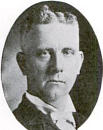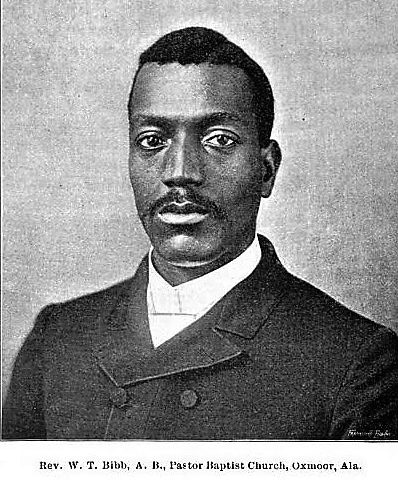Unlock this story. Click to see how to Become a Patron and read thousands of lost and forgotten Alabama stories
 CHANCELLOR RICHARD BUSSEY KELLY
CHANCELLOR RICHARD BUSSEY KELLY
BIOGRAPHY and GENEALOGY
(1859-after 1904)
Calhoun County, Alabama
The family of which Richard Bussey Kelly was a member dates back to the years before the American Revolution, when an Irish lad, tiring of the oppression of England, decided to come to America, where men enjoyed the privileges of political and religious freedom. This Irish lad, William Kelly, settled in Wake county, N. C., where his son, Sims Kelly, was born in 1784. Sims Kelly, loving liberty like his father, became one of the combatants when war was declared against England in 1812. About this time the family moved to Tennessee, and thence, in 1840, to Alabama, and there the members dispersed, some going to Texas, some to Arkansas, and some remaining in Alabama.
One son, Samuel Camp Kelly, father of Richard B., remained in Alabama, and died there Sept. 16, 1891. Samuel Camp Kelly served with distinction in the Mexican war under Gen. Zachary Taylor, and later under Gen. Scott.
In 1851 he married Amie Elizabeth Pace, daughter of Richard and Amie (Bussey) Pace. Richard Pace was a prominent Baptist minister, and there is a quaint old family record which says of him and his wife, “They had nine children, two dying in infancy, seven being reared to manhood and womanhood— all being Baptists.”
Samuel Camp Kelly enlisted in the Confederate army in April, 1862, and served in all the battles in which the Western army was engaged, surrendering with Johnston in North Carolina, April 26, 1865. After the war he moved to Oxford, Alabama, where he resided until his death, an influential and valued citizen, taking an interest in every public enterprise, and contributing generously to Oxford college.
Richard Bussey Kelly was born in Calhoun county, Alabama, near Piedmont, Feb. 7, 1859. He was educated at Oxford college, Under Prof. John L. Dodson, and was graduated there, June 18, 1876, at the age of seventeen, with the degree of bachelor of arts. While in college he gave promise of forensic ability, and took part in many public debates.
He studied in the law department of the University of Alabama, under Judge Henderson M. Somerville and Hon. John M. Martin, entering on Jan. 4, 1879, and being graduated with honor and with the degree of bachelor of laws, on July 4, of that year. He was admitted to the bar on July 15, 1879, at Wedowee, Alabama, and began to practice in Oxford, Alabama, where he remained until 1884. He then removed to Jacksonville, which was then the county seat, and to Anniston in April, 1889. As a lawyer he was eminently successful, and soon established a reputation for legal acumen and erudition which won him a favorable reputation among his fellow attorneys and litigants, while his pleasant manners, genial disposition and kindness of heart made him friends of all with whom he came into contact.
In 1894, without solicitation on his part, the Democrats of Calhoun county sent him to represent them in the State legislature, where he made an enviable reputation as one of the most active and useful members of the house. He secured the passage of a law permitting the people of Calhoun county to vote on the question of removing the court house from Jacksonville to Anniston, and fathered other notable measures. In 1898 he was elected, as a Democrat, chancellor of the Northeastern chancery division of Alabama, winning over strong opposition.
After his elevation to the bench Chancellor Kelly had more than met the expectations of his friends, and commanded the respect and confidence of the bar of the State as an able and upright judge, while the manner in which he has dispatched the business of his courts attracted universal attention and much favorable comment. Chancellor Kelly was an ardent friend of the movement for a new State Constitution, was a member of the campaign committee whose action resulted in the calling of the convention, and, though not a member of that body, made suggestions to it which were adopted and became a part of the Constitution of the State.
He at all times took an active interest in the cause of education. Though not among the “elect” in the race for a place on the supreme bench in the primary of April 1I, 1904, his nattering vote of over 34,000 showed the high estimate the people place upon him. On Oct. 10, 1880, he married Leona Bledsoe of Talladega county, Alabama, a descendant of the North Carolina family of Bledsoes. Mrs. Kelly is a daughter of Francis Marion and Louisa Catherine (Vincent) Bledsoe. Her father was killed at Spanish Fort, near Mobile, Ala., April 9, 1865, while fighting for the Confederacy.
Chancellor and Mrs. Kelly had five children living in 1904,
- Francis Marion Kelly married Dr. Robert Daniel Irwin, of Anniston, Miss Marion Kelly was known as a writer of ability, her letters to the press from Europe attracted much favorable comment.
- Maud McLure Kelly,
- Richard B Kelly., Jr. was an attorney in Birmingham and a graduate of Howard college and the University of Alabma, member of the Sigma Nu college fraternity.;
- Samuel Bledsoe Kelly,
- William Milner Kelly resided in Birmingham
Chancellor Kelly was a Baptist, a Royal Arch Mason and an Elk. Gifted in mind, pleasant in manners, strong in body, courageous in spirit, an able lawyer, a ready speaker, a patriotic citizen, an upright man, loving his people and beloved by them, he was destined to figure prominently in the future history of the State.
Additional information on the family:
“Maude McClure Kelly, lawyer, was born at “Mountain Spring” near Sylacauga, Talladega County; daughter of Judge Richard Bussey and Leona (Bledsoe) Kelly (q. v.). Miss Kelly was educated at Noble institute, Anniston, and at the University ofAlabama, law department, where she graduated cum minima laude, LL. B., in 1908. She was admitted to the circuit court of Jefferson County on October 14, 1908, and to the supreme court of Alabama in 1909. She was made a notary public in 1905. She was a Baptist; was a patroness of Alpha Delta Pi sorority at Judson college; was organizer and charter member of the Birmingham equal suffrage association; chairman of the legislative committee of the State woman’s suffrage association; historian of William Lowdnes Yancey chapter, U. 1>. C.; national secretary of war, United States Daughters of War of 1812; member of D. A. R.; state president, Alabama Daughters of the War of 1812; member Alabama bar association and Birmingham lawyers league. Residence: Washington, D. C.”i
“Samuel Camp Kelly, planter, was born March 11, 1825, in Franklin County, Tennessee., and died September 9, 1891, at Oxford; son of Sims and Mary (Camp) Kelly, he former of whom was born in Wake County, N. C., March 11, 1785, In his youth, he moved to Georgia, where he lived in Wilkes and Washington Counties, later removing to Franklin County, Tennessee. He served in the War of 1812, was a great friend of the Indians, and the Creeks camped on his grounds on their way to their reservation. He was grandson of William and Mollie (Durham) Kelly, of Irish descent, and of Samuel and Mary (Banks) Camp, the former was born in Connecticut, May 14, 1753, and died in Warren County, Georgia in 1827, served as commissariat, in Revolutionary Army, on staff of Gabriel Penn with rank of captain; great grandson of Icabod and Phoebe (Canfield) Camp, the former of whom was born on February 15. 1726, at Durham, Conn., entered Yale, September, 1739. graduated A. B., September 14, 1743, and M. A., 1746, licensed Presbyterian minister, 1745-46, appointed to read prayers at Wallingford, Conn., September, 1748, appointed to read prayers at Middletown, May 29, 1748, received license of the Bishop of London March 27, 1752, in 1760 was called to the diocese at Wilmington, N. O., and in 1761 to Virginia, in 1778, went west to carry on Episcopal work with headquarters at Kaskaskia, where he was killed in 1785 by an intoxicated Spaniard. The latter was granddaughter of Thomas and Phoebe (Crane) Canfield and grandniece of Matthew Canfield one of the charterers of Connecticut, and of Gerard and Frances (Bruce) Banks,Jr.; great-great-grandson of Gerard and Frances (Strother) Banks.
Samuel Camp Kelly was educated by tutors and lived the life of the son of a wealthy planter. He served in the Mexican War, enlisting June 13, 1846, and was mustered out May 25, 1847. He enlisted as first lieutenant of Co. E, 30th Alabama infantry regiment, C. S. Army, of which Dr. J. C. Francis was captain. Francis soon became major, and Kelly was promoted captain. This company and others consolidated with it became known as Kelly’s Infantry, and he was later promoted major and served as colonel. After the war he lived on his plantation until 1867, when he removed to Jacksonville; moved to Oxford in 1872, when Oxford college was established.
He largely maintained this school in its infancy and its existence is due to his unfailing support. Married: January 19, 1851, to Amie Elizabeth Pace, daughter of Rev. Richard and Amie (Bussey) Pace, located at various times in Georgia, Alabama and Texas. Children: 1. Richard Bussey Kelly; 2. Dr. W. P. Kelly Last residence: Oxford.”
SOURCE
- Notable Men of Alabama: Personal and Genealogical, Volume 1 edited by Joel Campbell DuBose





Jennifer Dutton